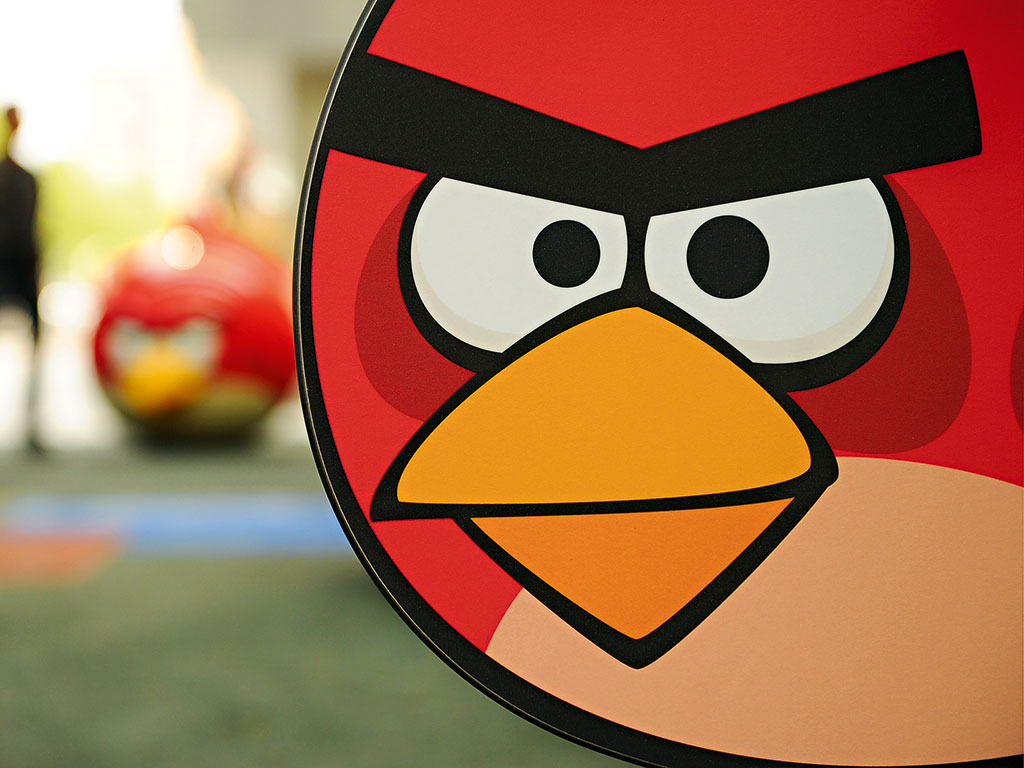Has mobile gaming lost its moral antenna?
Out of nowhere, mobile games have become a multibillion-dollar industry, but they are controversial. For everyone who finds them a handy bit of escapism, there’s someone else who thinks they’re exploitative

The iconic bird from Angry Birds, one of the most popular mobile games. Some have questioned the ethics of the mobile gaming market, and whether industry players have exploited the addictive tendencies of their customers

We live in a world in which every moment can be filled: sitting idly while waiting for an appointment, a train or a friend is now only a choice. The other option is to whip out our mobile phones and enjoy any game of our choosing, without the need to even visit a shop. And when we grow tired of that game, we can download another at the press of a button; within seconds, we can get lost again in a world of bright colours, fantastical creatures and heroic missions. Through mobile gaming, we can be transported to another place, from anywhere we happen to be.
The total value of mobile games is estimated to reach $25bn this year
Mobile games may have an addictive element, but anything enjoyable has a level of compulsion, from sports to television programming to retail therapy; it is up to the individual to choose to participate in the activity. The demand for fun, easy-to-play mobile games exists, so it is logical that businesses have stepped in to fill the void. According to a recent report by games market research firm Newzoo, the total value of mobile games is estimated to reach $25bn this year, a growth of 42 percent from 2013.
Some mobile games have amassed a worldwide following and can afford to advertise with television commercials. According to figures from Superdata Research, Clash of Clans has taken the lead, becoming the highest earning mobile game of 2014 with a gross profit of $1.8bn. Candy Crush Saga continues to be a consumer favourite, with over 350m monthly unique users, while Angry Birds, one of the first games in the industry to gain multinational fame, has spun-off a huge line of merchandise, ranging from clothing to stationery and numerous toys and attractions in between.
There are those who argue mobile gaming exploits the psychological vulnerabilities of consumers in order to keep them hooked. But that is the goal for all businesses; repeat custom is the mainstay of any industry. Understanding consumer behaviour and preferences in order to offer products they not only like but love is the only way to stay ahead in fierce markets. It is not reasonable to expect this to be different in the world of mobile gaming.
Arguably, mobile games need to tap into the consumer psyche even more than other products due to the nature of the market: there are thousands of games available on both Android and Apple operating systems. Appealing to the masses, providing that sense of satisfaction upon reaching a new level and keeping players wanting more is the only way industry players can hope to make headway in such a highly competitive market and make a profit. In such a hard sector to crack, those that become successful – and incredibly successful at that – should be commended, not berated.
Given the current lack of financial confidence, it’s been difficult to encourage spending. But despite that pressure, a whole new industry has managed to surface: one that continues to grow and spill revenue over into various markets, from retail to television. The argument that mobile games are addictive can be easily squashed: they are optional, no one is forced to play games on their phone. And if someone wants to enjoy themselves without spending a single penny, they can – a rarity in the entertainment world. Mobile games, unlike other online services, do not always require personal data; those that do can simply be deleted if the player so wishes.
Mobile gaming offers a form of escapism that is both highly convenient and enjoyable, while being for the most part free. Game on.

Mobile gaming is big business. As a whole, the industry is projected to generate more than $12.6bn in 2016. One of the most successful titles in the industry is Candy Crush Saga, which, though briefly overtaken by Fallout Shelter as the top-grossing iOS app earlier this year, quickly regained the top spot a few weeks later, according to data gathered by App Annie.
Candy Crush Saga has managed to attract more than 93m daily users
Despite its slight slip, Candy Crush Saga has managed to attract more than 93m daily users to its confectionary-themed puzzler. It is an impressive figure, especially for a game that is free to download, with developers making their money by players spending on in-app purchases and add-ons.
While King Digital Entertainment, the developers behind the game, can boast they created one of the most popular mobile games on the market, they must also applaud how they have been outplayed by the Covet Fashion app when it comes to monetisation. Developed by Crowdstar, the game allows players to dress up digital models from a collection of clothing and accessories in order to complete various style challenges. But here is the clever bit: once the look is completed, players have the option to purchase any of the items they chose.
But no matter how ingenious the methods of monetisation various developers choose to use, the people most susceptible to their techniques, and who provide profit for the companies behind these mobile games, are victims of addiction.
A recent report by Swrve found 0.15 percent of mobile gamers bring in 50 percent of all revenue generated from in-app purchases in free-to-play games. A small clutch of addicts play these ‘freemium’ mobile games and become so addicted, and are spending so much cash on in-app purchases, that they end up contributing half the industry’s total revenue.
The developers of these games use a number of techniques to get these addicts to part with their money: forcing players to wait for long periods of time before being allowed to progress further, unless they pay; providing positive reinforcement through various stimuli; making the games complicated enough to hold the players attention, but simplistic enough to not require all of it; and ensuring the game never has a conclusion, so players keep coming back for more. If these tactics sound familiar, it’s because they are the same ones employed by the makers of fixed odds betting terminals.
While playing these games isn’t exactly gambling, the symptoms of addiction and the behaviour these gamers exhibit is the same as any other addict. It has been shown playing video games, and particularly freemium titles, causes the brain to act in a similar fashion to that of a heroin addict.
And here’s the real issue with this type of mobile game: if the developers were truly trying to create an entertaining gaming experience for players, rather than simply attempting to pry money out of addicts’ hands, they would have created games good enough that consumers would be willing to pay for them outright.
Consumers understand developers need to make money; not everything can be given away for nothing. If freemium mobile games want to turn a profit then sell adverts, and if players don’t want them, then ask them to pay a premium. But generating half your total revenue by taking advantage of victims of addiction is a disgusting thing to be a part of.













